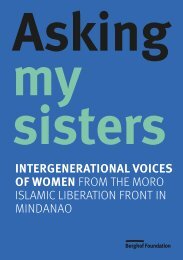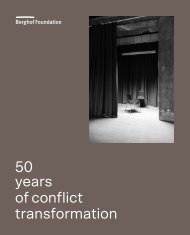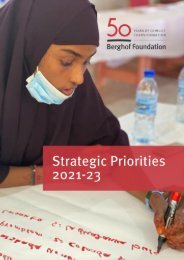Strategic Priorities 2022-2025
In order to adopt to a digitalised world, a planet facing ecocide through climate change and further global challenges, the Berghof Foundation as an organisation has to evolve as well. We are therefore expanding our activities beyond our established focal areas into six additional areas of strategic importance. How Berghof intends to go about it over the next four years is the subject of this document.
In order to adopt to a digitalised world, a planet facing ecocide through climate change and further global challenges, the Berghof Foundation as an organisation has to evolve as well. We are therefore expanding our activities beyond our established focal areas into six additional areas of strategic importance. How Berghof intends to go about it over the next four years is the subject of this document.
You also want an ePaper? Increase the reach of your titles
YUMPU automatically turns print PDFs into web optimized ePapers that Google loves.
harsh repression and other provocations, there are risks that some movements may lose their<br />
commitment to nonviolent action, and instead become trapped in a spiral of violent escalation.<br />
Peacebuilding skills can help movements maintain their nonviolent spirit and prepare<br />
themselves for effective participation in dialogue processes.<br />
Over the next three years, we will use our long-standing experience in participatory research,<br />
capacity-building in mediation, peer-learning approaches, and dialogue facilitation to analyse<br />
and engage with protest movements as key drivers of conflict transformation. Our aim is to help<br />
insider mediators and other third parties play constructive roles in preventing violent escalation<br />
and supporting inclusive transitions from civil resistance to democratic change. In addition, we<br />
will enhance synergies with other emerging focal areas by developing projects with protest<br />
movements mobilising for climate justice, gender equity, transparency and transitional justice.<br />
3 Inclusive governance and accountability to mitigate corruption and<br />
other economic drivers of conflict<br />
Economic factors contribute to the emergence and prolongation of war. In our work, we need to<br />
take the following areas into consideration, where economic factors directly feed into violence<br />
and influence the prospect of conflict transformation:<br />
Unequal resource distribution is a key source of violent conflict. Resources might entail natural<br />
resources, financial benefits or more complex systems of corruption (both political and<br />
economic). Besides the enrichment of a particular social group, systems of patronage secure<br />
political loyalty by granting economic privileges. If conflict transformation does not address<br />
these resource distribution systems, it will not succeed.<br />
War also produces its own shadow economy that creates incentives for a new set of actors who<br />
have a strong interest in maintaining their war-related profits and benefits. In order to contribute<br />
to a meaningful transformation of conflicts, these incentives have to be well understood and<br />
taken into consideration.<br />
At the same time, positive economic incentives can contribute to successful conflict<br />
transformation. The support of societal groups, including the private sector, can be mobilised for<br />
needed reforms and to ensure their ongoing backing for peace agreements, for example through<br />
tangible peace dividends, such as improved service provisions, safety and security, employment<br />
opportunities, land reform, and renewable energy infrastructure. Therefore, we will support<br />
inclusive governance and accountability mechanisms to help re-build trust in the state and its<br />
institutions and reduce corruption.<br />
Page 11 | 13










